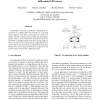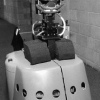150 search results - page 13 / 30 » Bayesian Landmark Learning for Mobile Robot Localization |
107
click to vote
ICRA
2007
IEEE
15 years 8 months ago
2007
IEEE
—Our sensor selection algorithm targets the problem of global self-localization of multi-sensor mobile robots. The algorithm builds on the probabilistic reasoning using Bayes fil...
120
click to vote
CVPR
2005
IEEE
16 years 4 months ago
2005
IEEE
In this paper we present a method for computing the localization of a mobile robot with reference to a learning video sequence. The robot is first guided on a path by a human, whi...
112
Voted
ICRA
2009
IEEE
15 years 9 months ago
2009
IEEE
— Visual localization and mapping for mobile robots has been achieved with a large variety of methods. Among them, topological navigation using vision has the advantage of offeri...
116
click to vote
ICRA
2002
IEEE
15 years 7 months ago
2002
IEEE
— When using appearance-based recognition for self-localization of mobile robots, the images obtained during the exploration of the environment need to be efficiently stored in t...
133
click to vote
CVPR
1999
IEEE
16 years 4 months ago
1999
IEEE
To navigate reliably in indoor environments, a mobile robot must know where it is. This includes both the ability of globally localizing the robot from scratch, as well as trackin...


